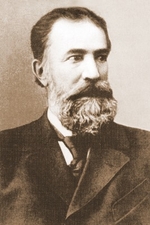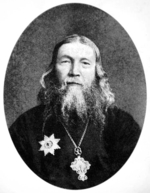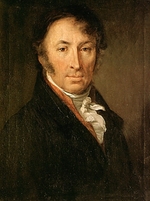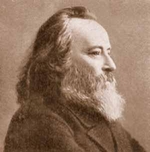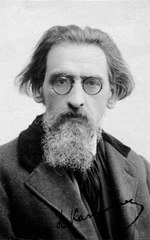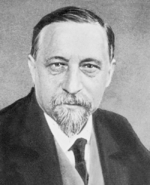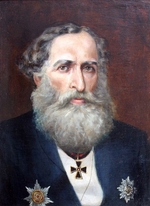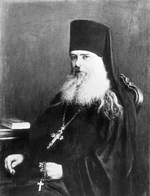Articles
Kapeliush Fedor (1876–1945)
Kapeliush Fedor (1876–1945) – writer, journalist, translator, historian of religion, author of articles and booklets on political history. He translated works by K. Marx and K, Kautsky from German. In the Soviet religious history he left two inputs: his books ‘Religion of Early Capitalism’ and ‘Economics and Religion’, where he analyzed a concept of interrelations of economics and religion. According Marxist social and economical theory, he argued that in the epoch of early capitalism there was a specific religious ideology as a supplement to the economical basis. He criticized leading Western theoretical thinkers in the field of sociology of religion from Marxist positions – he knew their works quite well. Particularly, he was critical to the theory by M. Weber and W. Sombart, who wrote that Calvinism was an important term of shaping capitalism; K. offered to turn that theory out and pout economics in the basis and to explain ascetic views of Calvinists with the conditions of initial accumulation of capital and growing industry.
Read More
Kapterev Nickolay (1847–1917)
Kapterev Nickolay (1847–1917) – historian of the Church.
He studied at the Zvenigorod Spiritual School, then at the Vifanskaya Spiritual Seminary (at the Saviour Bethany Monastery in Sergiev Posad), and then at the Moscow Spiritual Academy. In 1872, he graduated from the Historical Department and brilliantly defended his Master thesis ‘Laic Bishop’s Clerks in Old Rus’. He was invited to work at the Moscow Spiritual Academy, at the Chair of Old Civic History. There he got a position of Ass. Professor, then – Full Professor. In 1898, he became Honourary Professor. Besides his work at the Academy, K. Served as City Headman in Sergiev Posad from 1894 till 1902; in 1912-1917, he was a deputy of the IV State Duma from the Party of Progress. In 1910, he was elected as Correspondent Member of the Ac. of Sc.
Read More
Antonine (Kapustin Andrey Ivanovich) (1817–1894)
Antonine (Kapustin Andrey Ivanovich) (1817–1894) – specialist in Byzantine studies, in ecclesiastic history, in Palestine studies, archeologist and collector, who made a big input into the Russian tradition of studying Near East, Minor Asia, and Greece, archimandrite
In 1843, he got his Master degree in Theology at the Kievan Spiritual Academy; in 1845, being Bachelor, he got monk’s rank and kept his teaching and research work at the Academy. Since 1850, he was rector of the church at the Russian Embassy in Athens. In the course of works on the restoration of the church, he – for the first time – headed archeological excavations; then he got the rank of archimandrite and at the same time made his first publication ‘On the Ancient Christian Inscriptions in Athens’. He travelled to the Athos and studied old manuscripts and printed books there. In 1860-1865, he was rector of the church at the Russian Embassy in Constantinople; in 1865, he was transferred to Jerusalem, where – from1869 and till his death, he was head of the Russian Ecclesiastic Mission.
Read More
Karamzin Nickolay (1766–1826)
Karamzin Nickolay (1766–1826) – Russian historian, writer, translator, publisher.
He studied at the Pension of I. M. Schaden, Prof. of the Moscow University. In 1781-1784, K. served at the Life Guardian Preobrazhensky Regiment. In 1789-1790, he travelled in Europe and happened to visit France during the French Revolution, started in 1789. His travel notes were a base of his ‘Letters by a Russian Traveller’ – the first text of such gender in Russia. Having returned to Russia, K. published ‘Moscow Magazine’ (Moskovskyi zhurnal), where he placed his own composition, as well as others, and so he shaped the literary style of Sentimentalism in Russian literature. In 1803, he was officially assigned to be Historiographer and almost stopped to write fiction texts.
Read More
Kareev Nickolay (1850–1931)
Kareev Nickolay (1850–1931) – historian, philosopher, sociologist. Since 1910 – Correspondent Member of the Ac. of Sc., since 1929 – Honourary Member of the Ac. of Sc. of the U.S.S.R.
In 1873, he graduated from the Historical and Philological Faculty of the Moscow State University, where he past reading the courses by M. Kutorga and V. Gerie. In 1879, he defended his Master thesis ‘Peasants and the Peasants’ Issue in France in the Last Quarter of the Eighteenth Century’. In the same year, he started his teaching at the Warsaw University. Since 1885, he made lectures at the High Female Courses in St. Petersburg, at the St. Petersburg University, and the Aleksandrovsky Lyceum. After the Revolution 1917, K. was under constant surveillance becaue he was a member of the CD Party (Constitutional Democrats); he lost a chance to make lectures and to publish his works. On October 18, 1930, at the meeting of the Methodological Section of the Society of Marxist Historians, they harshly criticized his works.
Read More
Karsavin Lev (1882–1952)
Karsavin Lev (1882–1952) – historian, medievalist, historian of religious thought, philosopher.
In 1906, he graduated from the St. Petersburg University, where his supervisor was I. M. Grevs. He made lectures at the Historical and Philological Institute, at the High Female Courses, and since 1912, also at the St. Petersburg University. Master thesis: ‘Essays of Religious Life in Italy in the Twelfth – Thirteenth Centuries’ (1913); Doctor thesis: ‘Basics of the Medieval Religious Mentality in the Twelfth – Thirteenth Centuries, Particularly in Italy’ (1916). In 1921, he was elected as Professor of the Social-Pedagogical and legal Departments of the Faculty of Social Studies of the Petrograd University.
Read More
Kartashev Anton (1875–1960)
Kartashev Anton (1875–1960) – social-political and ecclesiastical activist, theologian, specialist in Biblical studies, historian of Russian Church, publicist.
He graduated from the Perm’ Spiritual Seminary (1894), and St. Petersburg Spiritual Academy (1899). He worked at the Chair of the History of Russian Church of the St. Petersburg Spiritual Academy (1899-1905). In 1905, the Synod demanded him to stop his participation in political and social activity or to quit the Academy. In 1905-1917, K. worked at the Public Library; in 1906-1917, he also made lectures at the High Female Courses. He was Chairman of the St. Petersburg Religious and Philosophical Society (1909), worked for the Novyi Put’ Publishing House; he was a member of the Masonic group ‘The Great East of the Peoples of Russia’ and a member of its High Council (1905-1917).
Read More
Kasem-bek Aleksander (Mohammed Ali Mirza) (1802–1870)
Kasem-bek Aleksander (Mohammed Ali Mirza) (1802–1870) – Orientalist.
In 1826, he was assigned to the Kazan’ University as Lecturer in Arabic and Persian languages. In 1828, he became Head of the Chair of Turkish-Tartar language. In 1829, he became Honuored Member of the British Royal Asian Society. In 1831, he got his Master degree and a position of Adjunct in Oriental literature for his work ‘A View on the History of Arabic Language and Literature’. Since 1835, he was Correspondent Member of the Russian Ac. of Sc. In 1836, he became Ass. Professor, and in 1837 – Full Professor at the Chair of Turkish-Tartar language.
Read More
Archimandrite Leonid (Kavelin Lev Aleksandrovich) (1822–1891)
Archimandrite Leonid (Kavelin Lev Aleksandrovich) (1822–1891) – philologist, bibliographer, archeologist, ethnographer. Correspondent Member of the Imperial Ac. of Sc. at the Department of Russian language and literature (1882), Correspondent Member of the Imperial Archeographic Commission (1863), Member of the Imperial Society of History and Russian Antiquities (1867). Specialist in the history of Russian Church, history of monasteries, medieval religion.
He studied at the Cadet Corps (till 1840); in 1852, he resigned and went to the Optina Hermitage as Novice. In 1857-1859, he served at the Russian Ecclesiastical Mission in Jerusalem; in 1859-1863 – in the Optina Hermitage; in 1863-1865, he was Head of the Russian Ecclesiastical Mission in Jerusalem.
Read More
Kazakova Natalya (1915–1984)
Kazakova Natalya (1915–1984) – historian, medievalist.
In 1939, she enrolled at the Legal Faculty of the Leningrad Institute of Literature, Philosophy, and Culture. In 1945. he defended her Candidate thesis on the contacts between Rus’ and Baltic Lands; she specialized in the history of the Hanseatic League. In 1952-1960, she worked at the Museum of the History of Religion of the Ac. of Sc. of the U.S.S.R. In 1960, she transferred to the Leningrad Branch of the Institute of History of the Ac. of Sc. of the U.S.S.R.; she worked also at the Institute of Russian Literature (Pushkinsky Dom) of the Ac. of Sc. of the U.S.S.R.
Her work at the Museum of the History of Religion made her for shaping a new field of research interests: K. started to study the religious culture of Rus’.
Read More
Showing 101-110 of 351 items.


